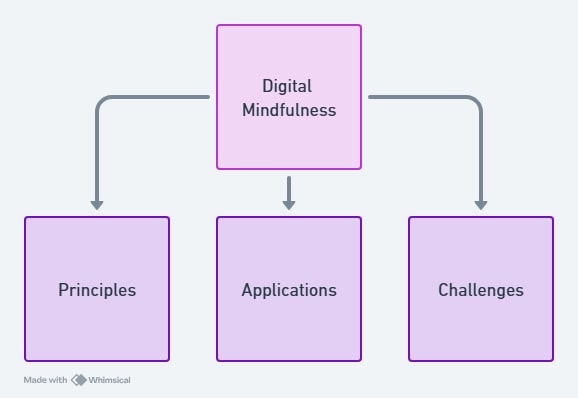Cultivating Digital Mindfulness: Buddhist Practices for Navigating Social Media and Enhancing Well-Being
คำสำคัญ:
Digital Mindfulness, Buddhist Practices, Social Media, Mental Well-Being, Compassionบทคัดย่อ
The paper, "Cultivating Digital Mindfulness: Buddhist Practices for Navigating Social Media and Enhancing Well-Being," examines the integration of Buddhist mindfulness practices into digital environments, offering strategies to address the challenges posed by social media. In an era marked by constant connectivity and digital distractions, the study explores how mindfulness techniques derived from Buddhist principles, such as non-attachment, self-awareness, and compassion, can transform online interactions and improve mental well-being. The research highlights practical applications of mindfulness, including meditation and reflective pauses, to mitigate negative emotions, reduce digital addiction, and foster more meaningful online engagement. Furthermore, it emphasizes the role of intentionality in curbing compulsive behaviors, promoting ethical digital consumption, and building supportive online communities. This study bridges traditional mindfulness with contemporary technological challenges, providing actionable insights for individuals seeking balance and resilience in their digital lives. It concludes by advocating for widespread adoption of digital mindfulness practices to create a healthier and more compassionate digital culture.
เอกสารอ้างอิง
Repetti, R., Purser, R., Forbes, D., & Burke, A. (2016). Meditation Matters: Replies to the Anti-McMindfulness Bandwagon. Retrieved from https://core.ac.uk/download/145643226.pdf
Sivek, S. C. (2018). Both Facts and Feelings: Emotion and News Literacy. DigitalCommons@Linfield. Retrieved from https://core.ac.uk/download/212894731.pdf
Swinnerton, E. L. (2015). Mindful Stitch: Generating Dialogue in and Around the Threads of Wellbeing. University of Huddersfield Press. Retrieved from https://core.ac.uk/download/30731175.pdf
Dhiman, B. (2023). Media Role in Promoting Values & Meditation for Sustainable Development: An Overview. Anatomische Gesellschaft. Retrieved from https://core.ac.uk/download/576856909.pdf
Anderson, J., Bombaerts, G., Dennis, M., Frank, L., Gerola, A., Hannes, T., ... & Spahn, A. (2023). Attention as Practice: Buddhist Ethics Responses to Persuasive Technologies. Retrieved from https://core.ac.uk/download/604657645.pdf
Ebsen, K. M. (2013). An Exploration of Contemplative Practice in the Life of the Art Therapist. Digital Commons at Loyola Marymount University and Loyola Law School. Retrieved from https://core.ac.uk/download/267179668.pdf
Carvalho, A., & Grácio, R. (2022). The Dark Side of Mindfulness: Workplace Socialization, Neoliberalism and the Self. The Editorial Board. Retrieved from https://core.ac.uk/download/551322362.pdf
Gurewitz, K. I. (2020). Mindful of a Profit? A Critical Analysis of Meditation Apps in the Context of Neoliberalism and Western Constructions of Religion. Sound Ideas. Retrieved from https://core.ac.uk/download/345769110.pdf
Capiro, N. M., Gleason, A. L., & Powers, S. (2019). The Impact of a Neuroeducation-Based Wellness Curriculum on Generation Z: Implementing Mind-Body Connection. Grupo Compas. Retrieved from https://core.ac.uk/download/228460876.pdf
Elder, H. H. (2020). Be Still: A Pedagogical Analysis of Mindfulness-Based Practices in Vocal Music Education. Scholars Crossing. Retrieved from https://core.ac.uk/download/365589534.pdf
Bell, G., Braun, V., Friedman, B., Munson, S., Paredes, P. E., Roquet, C. D., & Walsh, Z. (2020). From Ancient Contemplative Practice to the App Store: Designing a Digital Container for Mindfulness. Association for Computing Machinery (ACM). Retrieved from https://arxiv.org/abs/2006.09521
Huang, P. H. (2017). Can Practicing Mindfulness Improve Lawyer Decision-Making, Ethics, and Leadership?. Colorado Law Scholarly Commons. Retrieved from https://core.ac.uk/download/534815258.pdf
Bhibulbhanuvat, S., Boonrugsa, T., Doungphummes, N., Sasiwongsaroj, K., & Suebwongsuwan, W. (2024). Integrating Mindfulness in Media Literacy: A Culture-Responsive Training Programme for Older Thai Adults. DigitalCommons@URI. Retrieved from https://core.ac.uk/download/604669743.pdf
Valencia, G. (2020). Calm: A Mindfulness Mobile App for Stress Reduction in the Workplace. Digital USD. Retrieved from https://core.ac.uk/download/304686167.pdf
Martin, M. W. (2021). Mindful Technology. Chapman University Digital Commons. Retrieved from https://core.ac.uk/download/591434665.pdf
Deroche, M. H. (2021). Living Mindfully Through Crisis: Searching for Life Advice in the "Philosophy-Medicine" of Buddhism. University of Warsaw. Retrieved from https://core.ac.uk/download/541150330.pdf
Yeung, B. (2017). Cultivating a Culture of Compassion Among Newly Graduated Registered Nurses: An Evidence-Based Mobile Learning Toolkit. USF Scholarship. Retrieved from https://core.ac.uk/download/216984957.pdf
Thomas, H. (2020). Pedagogies of Presence: Contemplative Education Across the Disciplines in Aotearoa New Zealand. Massey University. Retrieved from https://core.ac.uk/download/345037769.pdf
Brown, J. (2012). A Mindfulness-Based Art Therapy Curriculum for Parents in Underserved Communities. Pepperdine Digital Commons. Retrieved from https://core.ac.uk/download/288853714.pdf

ดาวน์โหลด
เผยแพร่แล้ว
รูปแบบการอ้างอิง
ฉบับ
ประเภทบทความ
หมวดหมู่
สัญญาอนุญาต
ลิขสิทธิ์ (c) 2024 วารสารวิชาการสังคมศาสตร์สมัยใหม่ (Online)

อนุญาตภายใต้เงื่อนไข Creative Commons Attribution-NonCommercial-NoDerivatives 4.0 International License.





